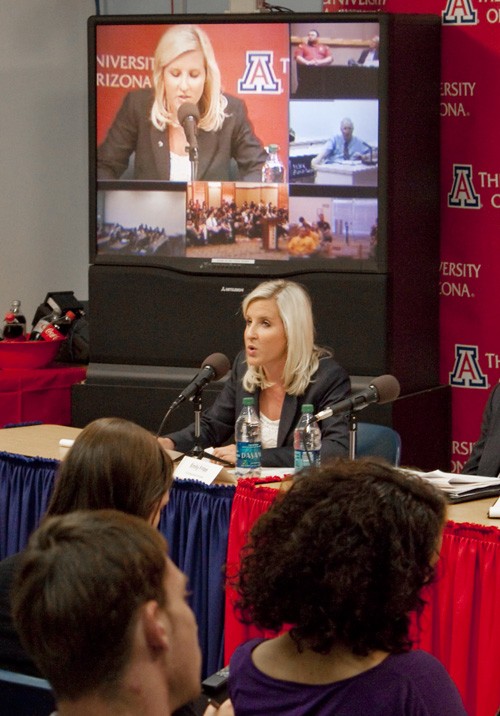Students shared personal examples of how rising tuition costs will affect their lives during an Arizona Board of Regents tuition hearing on Monday.
The live videoconference allowed students to give testimonials at eight university campuses throughout the state. The hearing provides regents with student input before they set tuition for the 2011-2012 academic year at their next meeting on April 7.
All university presidents proposed increases in tuition and mandatory fees for next year. UA President Robert Shelton proposed a $1,798 increase in tuition and mandatory fees for resident students and $898 for non-resident students.
Each president presented his tuition proposal at the hearing, and student leaders were given a designated time to speak. About 30 other speakers from various campuses, who signed up before the hearing, were each given two minutes to speak to the regents.
UA student Alisha Raccuia, a cultural psychology junior who transferred from a community college, said the tuition increases may put her future in jeopardy. She said she saved money by attending a community college but has already taken out $27,000 in loans during one year at the UA.
“”I am truthfully scared of what is to come,”” Raccuia said. “”I’m scared of losing my Pell Grant I received for next year. I’m scared I’m going to have to take out a second job. I’m scared I might have to actually reconsider being a student here.””
Associated Students of the University of Arizona President Emily Fritze shared another story of a student who would be affected by rising tuition costs. Rosa, a student Fritze met during the weekend, has two jobs and works 60 hours a week to pay for school and support her mother.
“”Her first priority is paying the bills,”” Fritze said.
Increases in tuition will heighten the struggles of students like Rosa, Fritze said. These students often cannot participate in all the university has to offer because they are trying to make ends meet.
“”It is this experience that should not be a privilege for the few,”” Fritze said.
Budget cuts have made the jobs of the regents difficult, Fritze said.
“”All we can ask for is a healthy discernment of what tuition increases are really necessary,”” she said.
Students also spoke about the increase in mandatory fees at the UA, including a $150 increase to the health and recreation fee and a $125 to the information technology and library fee.
Public health and business graduate student Kim Romney spoke in favor of the health and wellness fee, saying it will ensure the quality of vital services.
“”What could be more important than the health and wellness of students?”” Romney asked.
These overall increases in tuition and fees could drive students out of Arizona, said Michael Stefferson, a physics senior. Stefferson receives a merit-based scholarship and said the UA was the most cost-effective university option.
“”What this is doing is pushing a lot of top students in the state away from the state,”” he said. “”To stay competitive, (Arizona) needs its best and brightest to stay in Arizona. As soon as they leave, they’re probably not coming back.””
UA alumna Margie Wrye told regents tuition was $650 during her first year at the university in 1981.
“”You and our state lawmakers are going to force many young people into debt they should not have to carry from a state university,”” she said.
Tuition increases will prevent some people from receiving degrees, according to Stefferson.
“”It’s systematically segregating our schools,”” Stefferson said. “”We’re going to see two groups of people: those who can’t pay, and those who can pay.””









